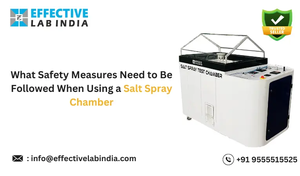More from Effective Lab India
More in Politics
Related Blogs
Archivo
compartir social
What Safety Measures Need to Be Followed When Using a Salt Spray Chamber?
Cuerpo
The metal industry has traditionally placed a high priority on a material’s ability to withstand corrosion, which is why salt spray testing is necessary. The durability of materials can be readily ensured by producers by testing metal or products related to it with the Salt Spray Chamber Digital Model a state-of-the-art lab testing apparatus built by Effective Lab that makes it simple for metal manufacturers to do reliable salt spray tests on their materials.
This state-of-the-art salt spray test chamber provides a unique interactive environment that can synthesize salt spray with air drying and wetting/condensation for a thorough investigation of corrosion resistance, assisting the manufacturers in conducting accurate salt spray testing.
Manufacturers should make sure all operational safety alerts and criteria have been followed to the letter while conducting salt spray tests with this salt spray test machine.
We will talk briefly about the Effective Lab’s salt spray chamber— its extremely sophisticated features in this article. We will also briefly go over the safety measures that need to be followed when using this quality testing apparatus.
Make sure your product is resistant to corrosion by using a salt spray chamber.
An important stage in determining a material’s or coating’s corrosion resistance is salt spray testing. A standardized salt spray test protocol is followed in this process, which is carried out in a specialized salt spray test chamber.
You can evaluate your items’ resistance to the corrosive effects of salt and humidity by exposing them to a controlled environment of salt mist. Interpreting the findings of the salt spray test gives important information about how well the material works and how long it should last in actual use.
Features
- Model of Touchscreen Based on HMI
- built-in temperature controls
- Salt Spray Test mode activated, with test sample-specific parameter settings
- Digital Programmable Temperature Controller with Solid State Design and Corrosion Resistance PT-100 sensor
- Program profile for choosing and running the test’s settings.
- Simple Data Administration.
- PID, Air separator, test temperature, test and air purge duration, and other configurations can be created by users.
- Status display for the test that is currently running
- Sturdy construction with a triple-walled body reinforced with fibre
- The test chamber’s sample placements are easy to utilize.
- Canopy with pneumatic operation (exclusive to the 250-liter model)
- After the test for fog settling, do an air purge.
- Inside the sponge filter is a reservoir tank that has a low solution level alert.
- 5-point feature selection for Auto Tuning
- Temperature graph in real time versus
- Temperature data reading and data recording using a USB (Pen drive) option
- The Advanced Hysteresis feature allows users to adjust PID parameters.
- The Canopy’s tilt is kept constant to prevent droplets from falling directly onto the test sample.
- Low-compressed air alert (first smart gadget)
- Low NACL solution alert level.
- Protection against over- and under-voltage
- Real-time identification and monitoring of individual specimens.
- Preserve the history of faults (easy to determine the specific issue)
Precautions
To guarantee precise and trustworthy findings, quality testing requires the operation of a salt spray test chamber. The following safety measures need to be followed when using this equipment:
Appropriate Ventilation: To ensure a safe working environment and avoid the accumulation of corrosive vapours, make sure the testing area is properly vented.
High-quality salt solution: Carefully prepare the salt solution according to the suggested concentration and quality guidelines. Sodium chloride 5±1% weight by weight can be easily dissolved in 95% purified water or water with no more than 200 ppm total solids.
Make sure the salt is pure: Sodium chloride that is mostly free of nickel and copper and contains, on a dry basis, no more than 0.1% sodium iodide and no more than 0.3% of all impurities can be used. The solution’s pH should fall between 6.5 and 7.2.
Conditions: They should be continuously observed to make sure the test chamber’s humidity, temperature, and salt content stay within predetermined bounds.
Make sure that the salt solution from one sample does not spill over another sample by precisely fastening the canopy. To close the canopy, use the “Door close” button.
FAQ’s
1: What is the Salt Spray Test?
Ans: A SST is a test which is performed to evaluate a material and its protective layer for corrosion resistance. This test is done on an instrument known as the Salt Spray Chamber.
2: What is the Purpose of the Salt Spray Test Machine?
Ans: The purpose of a Salt spray machine is to evaluate the corrosion of a product. This Test is commonly done by several industries to check the durability of a product.
3: What is the process of Salt Spray Testing?
Ans: The main purpose of this testing is to check the durability of a product against corrosion. It is done to check how well a product resists corrosion.
4: Which salt is best for Salt Spray testing?
Ans: The best and most commonly used salt for SS Testing is Sodium Chloride (NaCl). Some other types of salts can also be used which include: magnesium chloride, calcium chloride, and Zinc chloride.
5: Which company makes Salt Spray tester in India?
Ans: Effective Lab India is best Manufacturer & Supplier in India. Our pricing & quality is No. 1 in India compared to other companies.














Comentarios